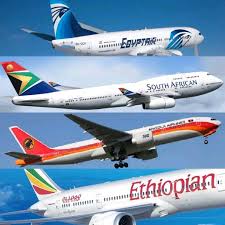Ethiopian Airlines has emerged as the biggest cargo carrier on the African continent, now controlling a whopping 35 percent of the cargo market, according to a new report from the African Finance Corporation (AFC).
The report, which forms part of the AFC’s annual infrastructure outlook, shows that Ethiopian Airlines is far ahead of the competition, with Kenya Airways and Royal Air Maroc jointly holding only 25 percent of the market. This dominant position underscores how Ethiopia has leveraged its national carrier to strengthen trade, especially in the fast-growing air cargo sector.
In contrast, passenger and cargo flights within Africa remain limited, particularly in West Africa, where European airlines continue to dominate. The AFC report encourages African countries to take cues from Ethiopia and Kenya, which have built strategic aviation models to support exports and regional trade.
Between 2016 and 2023, Ethiopian Airlines increased its cargo capacity from 266,000 metric tons to 715,000 metric tons annually. The airline now flies to 60 international cargo destinations, half of which are located within Africa. The cargo service is supported by a growing fleet of 16 dedicated freighter aircraft, with plans to expand to 37 aircraft by the year 2035.
By comparison, Kenya Airways recorded cargo volumes of 380,000 metric tons in 2023, showing that it remains a strong regional player. The report also mentions Rwanda, Egypt, and Côte d’Ivoire as countries with growing cargo capabilities. However, non-African carriers such as Qatar Airways are also expanding their presence in Africa’s air freight space, signalling growing competition from abroad.
The AFC report highlights that weak infrastructure remains a major obstacle to aviation growth in Africa. Poor roads, limited storage facilities, and outdated airport systems hinder the ability of many countries to compete globally in the air cargo space.
Beyond aviation, the AFC report covers several critical infrastructure sectors. For example, it identifies mining, agriculture, logistics, and information technology (IT) as industries with high growth potential if infrastructure challenges can be addressed.
In agriculture, the report praises Ethiopia’s rise as sub-Saharan Africa’s top wheat producer, growing its wheat cultivation area from just 5,000 hectares in 2018 to over 650,000 hectares by 2023. This massive increase reflects government-led irrigation schemes and mechanisation.
The AFC also points out that Morocco, Egypt, Nigeria, and South Africa hold strong potential in fertilizer production, but most of their output is being exported outside the continent. It also states that Ethiopia, Eritrea, Morocco, and the Democratic Republic of Congo have large reserves of potash ore, a crucial mineral used in making fertilizer. However, these resources are underutilized.
The report notes that African farmers have been hit hard by high fertilizer prices, a problem made worse by the ongoing Russia-Ukraine conflict. The war has disrupted global potash supply chains, as both countries are top producers of the mineral.
In the tech space, Ethiopia received praise for progress in digital infrastructure. The report points to a rise in telecom subscribers and the rapid adoption of digital technologies, especially mobile money and internet-based services. This digital transformation is seen as key to economic diversification and inclusion.
As Africa pushes for continental trade integration under the AfCFTA, Ethiopian Airlines’ performance offers lessons on how national carriers can drive regional trade and support economic transformation. Experts say that strong state support, targeted investments, and clear export goals are the pillars of Ethiopia’s aviation success story.
Despite these gains, the AFC report stresses that without continental investment in infrastructure, many African economies risk falling behind. It calls for public-private partnerships and deeper collaboration between African governments to modernise transport, agriculture, energy, and digital networks.
